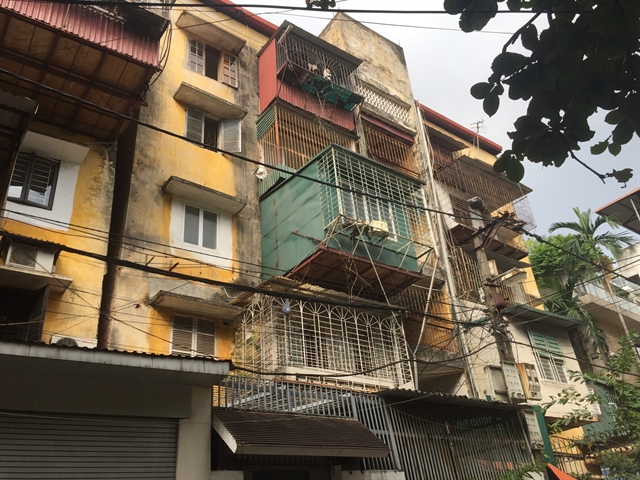Dangerous and degraded residential apartment blocks in Ha Noi will be renovated by 2025 in compliance with the project on renovation and reconstruction of old apartment buildings in Ha Noi, which was endorsed by the Ha Noi People’s Council on Thursday.

Dangerous and degraded residential apartment blocks in Ha Noi will be renovated by 2025.
The plan is part of a project on renovation and reconstruction of old apartment buildings in Ha Noi, which was endorsed by the Ha Noi People’s Council on Thursday.
This project, implemented during the 2021-25 period, aims to eliminate unsafe and degraded real estate and improve the city’s urban environment and people’s lives.
Data of the Ha Noi Department of Construction showed Ha Noi has nearly 1,600 old apartment buildings constructed between 1960 and 1994, some of which were even built before 1954. The city is reviewing to add about 200-300 properties to the list.
According to the construction department’s inspections, more than 400 buildings show signs of risk, of which 148 are classified as B-grade which means the building is still usable but some parts are degraded; 145 graded C which means some parts of the building are in dangerous condition and require reinforcement; and eight graded D which means under threat of collapse and need instant renovation and relocating of occupants.
However, Vo Nguyen Phong, director of the Ha Noi Department of Construction said so far only two of the eight “D-level” buildings have been rebuilt, including C1 Thanh Cong and B6 Giang Vo.
The survey has showed that, over the decades, most of the old apartments have reached the end of their lifespan, revealing many limitations in management, operation and exploitation. The repair of the premises leads to structural changes, posing threat of collapse and danger to people's lives. Especially during the COVID-19 pandemic, residents sharing ancillary works in the old apartment blocks was attributable to the high virus infection rate in the community.
The city’s authority has admitted challenges and difficulties in renovating and relocating residents in the old blocks for many years, which resulted in low efficiency in settling degraded apartments with just 19 projects put into use to date, accounting for just 1.2 per cent of the total number, while 14 projects are in progress.
In the meeting on Thursday, chairman of the Ha Noi People’s Committee Chu Ngoc Anh emphasised the urgency of revamping and reconstructing old and dangerous apartments to ensure residents are safe and refurbishing the city’s urban appearance.
Renovation plan
To speed up the rebuilding of numerous degraded properties in the city, the People’s Committee has outlined detailed plans for the implementation over the next five years.
The city will allocate a budget of VND500 billion (US$22 million) to inspect old apartments in the 2021-25 period, prioritising D-grade and other low-quality buildings, while at the same time outlining detailed plans for 76 old buildings by no later than the fourth quarter of 2023.
The Department of Construction will study and draw up the general plan to review, survey and inspect old apartment buildings, expected to be completed by December 15, 2021.
Anh said the city would prioritise six high feasible areas for renovation such as Kim Lien, Trung Tu, Khuong Thuong, Thanh Xuan Bac, Thanh Xuan Nam and Nghia Tan, and four D-grade zones such as Giang Vo, Thanh Cong, Ngoc Khanh and the Ministry of Justice apartment building in Ba Dinh District; as well as hasten 14 on-going projects as early as this year or next year.
To facilitate the work, the city will authorise district authorities to organise the implementation.
The next key solutions will focus on investor selection, site clearance and compensation, resettlement and temporary settlement support, establishing a temporary housing fund and creating preferential policies.
The Urban Committee suggested along with the investment incentives provided by the Government for such projects, the city’s authority needs to review and evaluate the effectiveness of the city's incentive mechanisms and policies and amend if necessary in order to attract investors in these projects. — VNS





